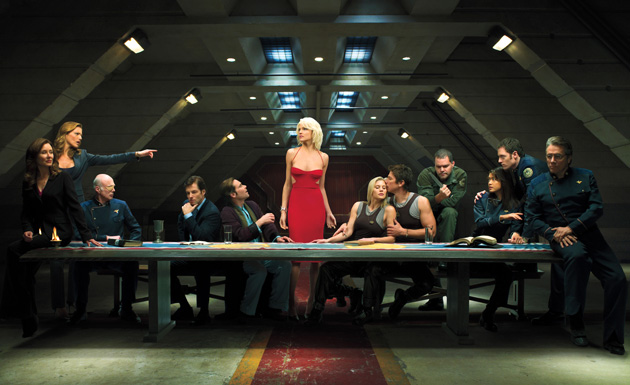 An interesting debate is quietly raging on the Internet concerning science fiction and religion. The debate was launched by the website Airlock Alpha with an article by Tiffany Vogt titled “TV Watchtower: Is Religion Killing Good Sci-Fi Shows?”. As Vogt tries to make her case for answering the question of the article’s title with a resounding “yes!”, she cites Battlestar Galactica, Lost, and Caprica as examples of programs that “lost their way” by relying to heavily on the incorporation of religion. Vogt concludes:
An interesting debate is quietly raging on the Internet concerning science fiction and religion. The debate was launched by the website Airlock Alpha with an article by Tiffany Vogt titled “TV Watchtower: Is Religion Killing Good Sci-Fi Shows?”. As Vogt tries to make her case for answering the question of the article’s title with a resounding “yes!”, she cites Battlestar Galactica, Lost, and Caprica as examples of programs that “lost their way” by relying to heavily on the incorporation of religion. Vogt concludes:
Therefore, modern-day television writers need to remember what kind of show they are writing and who they are writing for. If they are more interested in writing about theology, then they should write those shows and not distort good science-fiction shows beyond recognition. For what purpose does it serve to pull a bait-and-switch on the very audience that provided them with tenure?
But a fellow Airlock Alpha writer provided another point of view, articulated by Dennis Rayburn in “Religion, Science Fiction: Another Point of View.” For Rayburn, religion need not be seen as an unnecessary intrusion into the alternative worlds of science fiction. Rayburn writes:
Seeking to remove religion from science-fiction, in the name or returning science to it, will return the science, but what about the fiction? The immortal words of the opening of “Star Trek” said, “… to explore new worlds, to seek out new life and new civilizations.” We must be brave enough to explore what those new civilizations are like and not blindly assume that they will be extremely similar to ours.
As noted at the beginning of this post, the raising of the question at Airlock Alpha has sparked a debate on the Internet, a phenomenon discussed in yet another essay in this series at the website in a piece by Michael Hinman titled “So Tell Us Honestly, Is There Too Much Religion in Sci-Fi?”. In this essay Hinman summarizes some of the controversy over the issue, and also solicits reader feedback on the question.
In my opinion, science fiction is a genre of literature, television, and film that is just as suitable for the inclusion of various elements of the human experience as any other. Why not religion? The question should not be whether religion has a place within science fiction, unless one assumes sci-fi to be atheistic, and I have yet to see a good argument made that this should be the case, but whether religion plays an appropriate role in storytelling that captures the imagination and reflects the totality of human experience, many times religions, sometimes irreligious. Let the debate continue.
Related posts:
“Douglas Cowan Interview Part 1: Forthcoming Book ‘Sacred Space'”
“Douglas Cowan Interview Part 2: Sci-Fi, Transcendence, and ‘Sacred Space'”





I am actually happy that science fiction has finally found religion since before Babylon 5 everyone in the futuristic television programs is depicted as being a vague secular humanist who might have a religion but doesn’t necessarily want to talk about it or even acknowledge it.
Sure the original Battlestar Galactica was a lame Mormons in Space show but it definitely improved.
Of course, the problem isn’t religion in science fiction but religion being depicted badly in science fiction.